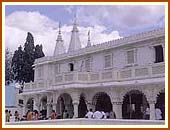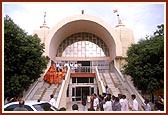| |
CE |
Day |
Event |
Vikram
Samvat |
Month |
Tithi |
| |
|
||
17 December || |
|
|
|
| 1801 |
Thursday |
Ramanand Swami passes away to Akshardham
from Faneni
|
1858 |
Mãgshar |
sud 13 |
| 1992 |
Thursday |
Murti-pratishtha at Vasana |
2049 |
Mãgshar |
vad 8 |
| |
|
|
|
|
|
| |
|
|
|
|
|
| |
|
||
18 December || |
|
|
|
| 1819 |
Saturday |
Vachanamrut Gadhada
I-19
Shriji Maharaj says, “In this Satsang fellowship, those devotees
seeking their own ultimate liberation cannot fulfil that aim by
atma-realisation alone; nor can they fulfil that aim by lovingly
offering the nine types of bhakti alone; nor can they fulfil that
aim by vairagya alone; nor can they fulfil that aim by swadharma
alone. Thus, all four virtues, i.e., atma-realisation, bhakti, vairagya
and swadharma should be perfected since all are dependent upon each
other.”
|
1876 |
Posh |
sud 1 |
| 1977 |
Sunday |
 Murti-pratishtha
at Dar-es-salaam, Tanzania Murti-pratishtha
at Dar-es-salaam, Tanzania |
2033 |
Mãgshar |
sud 9 |
| 1996 |
Wednesday |
Murti-pratishtha at Akshardip, Surat |
2053 |
Mãgshar |
sud 9 |
| |
|
|
|
|
|
| |
|
|
|
|
|
| |
|
||
19 December || |
|
|
|
| 1819 |
Sunday |
Vachanamrut Gadhada
I-20
Shriji Maharaj reveals how a devotee can overcome all deficiencies,
“For a person who has attained satsang, realisation of his
jivatma does, indeed, lie in his own hands. In fact, when has he
attempted to see his own self and failed to see it? Having become
dependent to and made helpless by maya, that jiva draws within and
enters the dream and deep sleep states, but never does it draw within
of its own accord to see its own self. On the other hand, one who
contemplates on the greatness of God and draws within oneself sees
one’s own self as extremely pure and luminous. In the midst
of that luminance, one beholds the form of the manifest Purushottam
Bhagwan and experiences bliss in the manner of Narad and the Sanakadik.
Therefore, all deficiencies which do remain in a devotee are due
to his own lethargy.”
|
1876 |
Posh |
sud 2 |
| 1819 |
Sunday |
"Vachanamrut
Gadhada I-21
Shriji Maharaj describes two forms of Aksharbrahma, “Akshar
has two forms. One, which is formless and pure chaitanya, is known
as Chidakash or Brahmamahol. In its other form, that Akshar remains
in the service of Purushottam Narayan. A devotee who has reached
Akshardham attains qualities similar to those of Akshar and forever
remains in the service of God. Furthermore, Shri Krishna Purushottam
Narayan is forever seated in that Akshardham. The countless millions
of muktas, who have attained qualities similar to those of Akshar,
reside in that Akshardham, and all of them behave as servants of
Purushottam. Purushottam Narayan Himself is the master of them all
and the Lord of the lords of countless millions of brahmands.”
|
1876 |
Posh |
sud 3 |
| 1825 |
Monday |
Vachanamrut Vartal-4 |
1882 |
Mãgshar |
sud 10 |
| 1998 |
Saturday |
Murti Pratishtha at Corpus Christi (Texas) |
2055 |
Posh |
sud 1 |
| |
|
|
|
|
|
| |
|
|
|
|
|
| |
|
||
20 December || |
|
|
|
| 1819 |
Monday |
Vachanamrut Gadhada
I-22
Shriji Maharaj emphasizes the need to constantly remember God to
attain peace of mind, “If one does not remember God while
singing to the accompaniment of a mrudang, sarangi, sarod, tal or
other instruments, then that singing is as good as not having been
sung at all. Besides, there are many people in this world who sing
and play instruments without remembering God; but they do not attain
peace of mind. Therefore, whichever activity one performs –
whether it be singing devotional songs, reciting God’s holy
name, chanting the ‘Narayan’ dhunya, etc. – one
should only perform that activity while remembering the form of
God.”
|
1876 |
Posh |
sud 4 |
| 2001 |
Thursday |
Murti-pratishtha at Khaparvada |
2058 |
Mãgshar |
sud 5 |
| 2001 |
Thursday |
Murti-pratishtha at Donaja (Women's
Mandir) |
2058 |
Mãgshar |
sud 5 |
| |
|
|
|
|
|
| |
|
|
|
|
|
| |
|
||
21 December || |
|
|
|
| 1819 |
Tuesday |
Vachanamrut Gadhada
I-23
A person who at times worships God with a concentrated mind and,
at other times, indulges in worldly thoughts does not develop such
an elevated spiritual state. Consider, for example, a pot that is
filled with water and emptied somewhere. If another pot of water
is subsequently emptied at the same place on the following day or
the day after that, a pool of water will not collect there. Why?
Because the water poured on the first day dries up on that very
day, and the water poured on the second day also dries up on that
same day. On the other hand, if a trickle of water were to flow
continuously, a large pool of water would soon be formed. Therefore,
while eating, drinking, walking, engaging in any activity whatsoever –
whether it be pure or impure – in fact, at all times,
one should constantly keep one’s vrutti on God. While maintaining
one’s vrutti constantly on God in this manner, one attains
that abiding elevated spiritual state.”
|
1876 |
Posh |
sud 5 |
| 1997 |
Sunday |
 Murti
Pratishtha at Navsari Murti
Pratishtha at Navsari |
2054 |
Mãgshar |
vad 7 |
| 2001 |
Friday |
Murti-pratishtha
at Saravani-Vandervela |
2058 |
Mãgshar |
sud 6 |
| |
|
|
|
|
|
| |
|
|
|
|
|
| |
|
||
22 December || |
|
|
|
| 1819 |
Wedensday |
Vachanamrut Gadhada
I-24
Shriji Maharaj states, “The extent to which one has understood
the greatness of God determines the intensity of both the divine
light experienced in the heart and the divine sound of pranav that
is heard. Furthermore, the extent of one’s faith and understanding
of the greatness of God determines the extent to which vicious thoughts
are curbed. Thus, when one develops absolute faith in God and thoroughly
understands His greatness, all of one’s vicious thoughts are
eliminated.”
|
1876 |
Posh |
sud 6 |
| 1974 |
Sunday |
Murti-pratishtha at Nanavat |
2031 |
Mãgshar |
sud 8 |
| 1977 |
Thursday |
Murti-pratishtha at Bhumel |
2034 |
Mãgshar |
sud 12 |
| 1992 |
Tuesday |
Murti-pratishtha at Shrijipura |
2049 |
Mãgshar |
vad 14 |
| |
|
|
|
|
|
| |
|
|
|
|
|
| |
|
||
23 December || |
|
|
|
| 1819 |
Thursday |
Vachanamrut Gadhada
I-25
Shriji Maharaj says, “A satsangi should never falter in observing
God’s injunctions. Why? Because God will be pleased with him
if he behaves accordingly.”
|
1876 |
Posh |
sud 7 |
| 1821 |
Sunday |
Vachanamrut Gadhada
II-19
Shriji Maharaj writes a letter to al His devotees, in which he reveals,
“One should offer upasana only to God and not to any deity;
if one does, then that is a grave sin, and thereby, one’s
vow of fidelity is lost and one’s bhakti becomes like that
of a prostitute. So, one should offer bhakti to God in the manner
of Sita and Rukmini. One should meditate only on that God and not
on any deity.” |
1878 |
Mãgshar |
vad 14 |
| |
|
|
|
|
|
| |
|
|
|
|
|
| |
|
|
|
|
|
|
|




